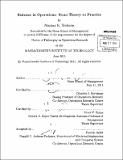Fairness in operations : from theory to practice
Author(s)
Trichakis, Nikolaos K
DownloadFull printable version (6.449Mb)
Alternative title
Fairness in operations.
Other Contributors
Massachusetts Institute of Technology. Operations Research Center.
Advisor
Dimitris J. Bertsimas and Vivek F. Farias.
Terms of use
Metadata
Show full item recordAbstract
This thesis deals with two basic issues in resource allocation problems. The first issue pertains to how one approaches the problem of designing the "right" objective for a given resource allocation problem. The notion of what is "right" can be fairly nebulous; we consider two issues that we see as key: efficiency and fairness. We approach the problem of designing objectives that account for the natural tension between efficiency and fairness in the context of a framework that captures a number of problems of interest to operations managers. We state a precise version of the design problem, provide a quantitative understanding of the tradeoff between efficiency and fairness inherent to this design problem and demonstrate the approach in a case study that considers air traffic management. Secondly, we deal with the issue of designing implementable policies that serve such objectives, balancing efficiency and fairness in practice. We do so specifically in the context of organ allocation for transplantation. In particular, we propose a scalable, data-driven method for designing national policies for the allocation of deceased donor kidneys to patients on a waiting list, in a fair and efficient way. We focus on policies that have the same form as the one currently used in the U.S., that are policies based on a point system, which ranks patients according to some priority criteria, e.g., waiting time, medical urgency, etc., or a combination thereof. Rather than making specific assumptions about fairness principles or priority criteria, our method offers the designer the flexibility to select his desired criteria and fairness constraints from a broad class of allowable constraints. The method then designs a point system that is based on the selected priority criteria, and approximately maximizes medical efficiency, i.e., life year gains from transplant, while simultaneously enforcing selected fairness constraints. Using our method, we design a point system that has the same form, uses the same criteria and satisfies the same fairness constraints as the point system that was recently proposed by U.S. policymakers. In addition, the point system we design delivers an 8% increase in extra life year gains. We evaluate the performance of all policies under consideration using the same statistical and simulation tools and data as the U.S. policymakers use. We perform a sensitivity analysis which demonstrates that the increase in extra life year gains by relaxing certain fairness constraints can be as high as 30%.
Description
Thesis (Ph. D.)--Massachusetts Institute of Technology, Sloan School of Management, Operations Research Center, 2011. Cataloged from PDF version of thesis. Includes bibliographical references (p. 131-136).
Date issued
2011Department
Massachusetts Institute of Technology. Operations Research Center; Sloan School of ManagementPublisher
Massachusetts Institute of Technology
Keywords
Operations Research Center.